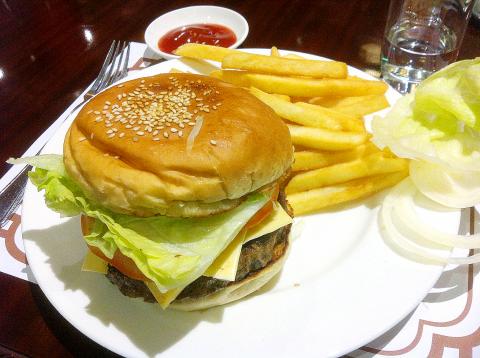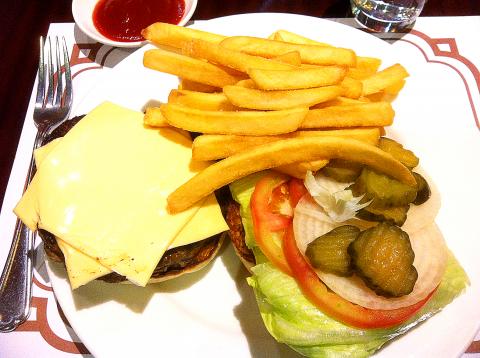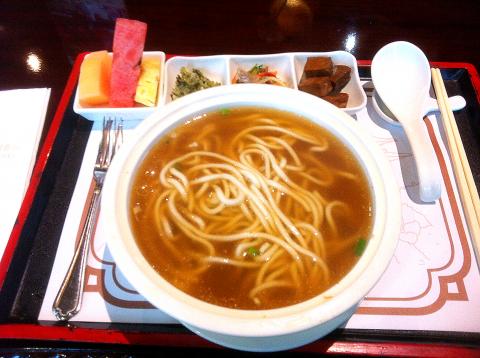It turns out that you can get a decent burger at The Grand Hotel, if you don’t mind paying a little extra.
The grand beef burger served by the hotel’s Grand Garden Restaurant (松鶴廳) might not live up to the name for those expecting five-star gourmet fare, but I found NT$390 to be a fair price. It soothed my homesickness for a burger at a greasy spoon diner in the US.
The restaurant’s version comes with the classic trimmings: plain iceberg lettuce, a few tomato slices, raw onion and pickles (strangely called “Chinese pickles” on the menu). The burger I had on my visit a few weeks ago was not absolute perfection –– the processed cheese slices weren’t melted onto the patty — but I certainly appreciated other simple details, such as the fact that the bun was buttered and toasted. And the crispy fries also helped me relive those good old late nights at cheap American diners. (A side note: tell the waiter your preference for how you want the burger done, as they won’t ask).

Photo: David Chen, Taipei Times
Now, for the same price and even less, you can get a fancier, and better quality burger at places like KGB on Taipei’s Shida Road (師大路). But consider that at the Grand Hotel, you’re also paying for the “view.” The Grand Garden Restaurant is located on the first floor, on the left side of the main lobby. Patrons sit in plush chairs, which allow you to kick back and marvel at the life-sized, bright red pillars that stand about the room and the beautiful, ornate wooden marquetry that fills nearly every inch of the high ceilings.
There is an anachronistic, almost kitschy feel to the Grand Hotel lobby, whose fading five-star glory has been eclipsed by the modern, swanky hotels of the capital’s East District (東區). The gigantic touchscreen guides for guests look goofy and out-of-place; much of the furniture is aging; the restaurant’s wait staff, though attentive, seem poorly trained. Still, none of this detracts from the magnificence of the lobby’s wide-open interior.
The Grand Garden’s a la carte menu is a mix of simple Western and Asian meals. Sandwich choices include BLT (NT$290), tuna croissant (NT$340) and croque monsieur (NT$320). Beverages are ridiculously overpriced. Plain coffee is NT$180, while a single shot espresso is NT$200. You can get coffee, tea or juice as part of the meals, including the burger and spaghetti bolognese (NT$390). For Asian choices, there’s fried rice or fried noodles and spicy curry chicken or beef with rice, all at NT$390 each. The beef noodle soup (牛肉麵, NT$390) is not too bad and comes in a large portion, but it’s not worth the price if you’ve got a hankering for good beef noodles. Save your money and spend it at one of the many award-winning places in town.

Photo: David Chen, Taipei Times
The Grand Garden is actually split into two areas –– the section in the front of the lobby is for diners who order a la carte. The area toward the back of the lobby offers an all-you-can-eat buffet. The spread includes both Asian and Western choices, and costs NT$780 for lunch and NT$890 for dinner. On weekends, those prices go up by NT$100.
Though there are free shuttle buses to the Grand Hotel from Yuanshan MRT Station (圓山捷運站), day-trippers might consider making a short hike to work up an appetite. The hotel can be reached on foot via the Qinshan Hiking Trail (親山步道), which starts on Zhongshan North Road (中山北路) near Jiantan MRT Station (劍潭捷運站). The walk uphill should take no more than 10 minutes and the path leads to a parking lot at the side of the hotel.

Photo: David Chen, Taipei Times

Most heroes are remembered for the battles they fought. Taiwan’s Black Bat Squadron is remembered for flying into Chinese airspace 838 times between 1953 and 1967, and for the 148 men whose sacrifice bought the intelligence that kept Taiwan secure. Two-thirds of the squadron died carrying out missions most people wouldn’t learn about for another 40 years. The squadron lost 15 aircraft and 148 crew members over those 14 years, making it the deadliest unit in Taiwan’s military history by casualty rate. They flew at night, often at low altitudes, straight into some of the most heavily defended airspace in Asia.

Beijing’s ironic, abusive tantrums aimed at Japan since Japanese Prime Minister Sanae Takaichi publicly stated that a Taiwan contingency would be an existential crisis for Japan, have revealed for all the world to see that the People’s Republic of China (PRC) lusts after Okinawa. We all owe Takaichi a debt of thanks for getting the PRC to make that public. The PRC and its netizens, taking their cue from the Chinese Communist Party (CCP), are presenting Okinawa by mirroring the claims about Taiwan. Official PRC propaganda organs began to wax lyrical about Okinawa’s “unsettled status” beginning last month. A Global

Taiwan’s democracy is at risk. Be very alarmed. This is not a drill. The current constitutional crisis progressed slowly, then suddenly. Political tensions, partisan hostility and emotions are all running high right when cool heads and calm negotiation are most needed. Oxford defines brinkmanship as: “The art or practice of pursuing a dangerous policy to the limits of safety before stopping, especially in politics.” It says the term comes from a quote from a 1956 Cold War interview with then-American Secretary of State John Foster Dulles, when he said: ‘The ability to get to the verge without getting into the war is

Like much in the world today, theater has experienced major disruptions over the six years since COVID-19. The pandemic, the war in Ukraine and social media have created a new normal of geopolitical and information uncertainty, and the performing arts are not immune to these effects. “Ten years ago people wanted to come to the theater to engage with important issues, but now the Internet allows them to engage with those issues powerfully and immediately,” said Faith Tan, programming director of the Esplanade in Singapore, speaking last week in Japan. “One reaction to unpredictability has been a renewed emphasis on